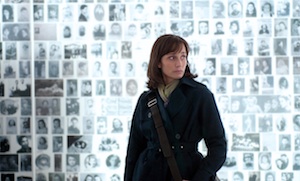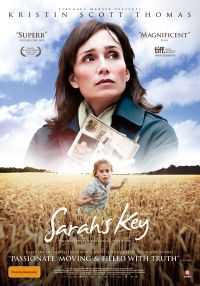The impact of the events of the Second World War left an indelible mark on the entire world, with the stories of so many atrocities committed within living memory resonating with generations of survivors and observers alike. The early Billy Wilder and George Stevens documentaries – such as Death Mills and Nazi Concentration Camps (the latter of which was presented as evidence at the Nuremberg trials), and even Orson Welles’ The Stranger (believed to be the first feature to show footage of the camps) – are indicative of the need for storytellers to keep these tragedies in the mind of the public so that they may never happen again. Despite well over 200 films and documentaries on the subject matter, including Steven Spielberg’s multi-award-winning Schindler’s List, filmmakers are still finding new ways to keep the memories alive for younger generations.
Sarah’s Key (Elle s’appelait Sarah or Her Name Was Sarah), from director Gilles Paquet-Brenner (Walled In) and based on a novel by Tatiana De Rosnay, shifts the focus to period and modern-day France. Julia Armond (Kristen Scott Thomas, Confessions of a Shopaholic), an American journalist living in Paris with her husband and daughter, is writing a piece on the Vel’d’Hiv Roundup in 1942 in France. Sarah (Mélusine Mayance) is a ten-year-old girl who is taken away from her home with her parents, but not before locking her brother in a cupboard to protect him. Taken to a camp, Sarah is desperate to get back to her brother before it is too late. Meanwhile, in modern-day Paris, Julia is determined to find out what her connection is with this tale, and begins to question her own life.
This is the kind of film that could have so easily fallen into schmaltz, and threatens to tip over into it on several occasions, but deftly skirts that possibility and instead gives us an intriguing drama. This is largely due to the shocking true elements to this story that many may be surprised to learn about. The Vel’d’Hiv Roundup, where 10,000 children and their families were taken from their homes, held in a velodrome in the middle of Paris for three days before shipping them all off to the camps all happened in the heart of the French capital. What most people will not know about this period of history is that it was the French police who took away the families, and not Nazi soldiers.
The film does not attempt to judge or create overwrought melodrama, but rather lets the story speak for itself. As director Paquet-Brenner points out, “We’re not in a good-versus-evil scenario—we have the facts, but also the consequences on future generations and we’re miles away from the usual shortcuts and simplifications”. It is not for modern audiences to judge, with many of the silent majority at the time (like the family depicted in the film) averting their eyes to save their own skin. It was a time of war, and few of us in the comfort of western modernity will ever (hopefully) know what this is like. Recent critical successes such as The Reader attempted to explain this through the stories of the generation living with the immediate consequences of the war, and the burden that came with it. Sarah’s Key achieves the dual success of relating this horror to the lives of modern audiences, while simultaneously accomplishing what The Boy in the Striped Pyjamas managed to do, and makes the facts accessible for children.
Sarah’s Key is often harrowing, but always compelling thanks to a terrific cast. Kristen Scott Thomas, effortlessly moving between French and English dialogue (with an American accent, no less!), perfectly embodies the feisty Armond. Even Aiden Quinn, who pops up in the final act for a bit of denouement, gives us an understated performance as the son of Sarah, who also begins to learn the truth about his family’s past. Yet it is Mélusine Mayance, as the young Sarah, who carries much of the film and lingers long in our minds after she has disappeared from the screen. Occasionally defying the bounds of logic, as war tends to do, and treading dangerously close to melodrama, it narrowly avoids it thanks to a story that should continue to disturb for another six decades.
Sarah’s Key hits Australian cinemas 23 December 2010 from Madman Entertainment.






No Responses